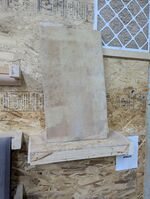Instructions:Wide Belt Sander
Purpose[edit | edit source]
The 37” wide belt sander contains a long rotating belt that runs parallel to an automatic feeding system. It is used for fine-tuning material thickness and surface finishing.
Safety[edit | edit source]
Do:
- Keep hands away from pinch points
- Watch the load indicator light to avoid equipment damage
- Feed on alternate sides of the belt (left-right) to avoid uneven wear
- Catch the workpiece as it exits the outfeed side
- Remove the finishing platen and spacer brick before changing belts
Do not:
- Try to take overly deep cuts
- Try to sand small pieces (less than 16” long x ⅜” thick) without a fixture
Emergency Stop[edit | edit source]
What does the emergency stop do? Does it just cut power or does it apply a brake? Fill in info here please.
Operating Procedure[edit | edit source]
Startup[edit | edit source]
- Check inside equipment for trapped debris (look between belt and platen).
- Check to see if finishing platen is installed before changing belts.
- Measure workpiece and adjust the table to the correct height (per guide located on the sanding bed).
- Ensure blast gates are open and turn on the room exhaust and dust collector. The equipment will not turn on if the dust collector or room exhaust is off.
- Stand to the side of the infeed table to avoid kickback.
- Turn on the air pressure switch and wait for the light to turn green.
- Turn on the sander power switch (located below the air pressure switch).
- Turn on the conveyor start switch (located below the sander power switch).
- Adjust conveyor speed using the speed knob.
Roughing Passes[edit | edit source]
- Load material into sander while observing the load indicator. If the load indicator illuminates, press E-STOP.
- Workpiece may be fed at up to 45 degree angle to the grain if desired.
- Feed on alternate sides of the belt to ensure even wear.
Finishing Passes[edit | edit source]
- Install finishing platen
- Feed material straight in, aligned with the grain.
- Observe the load indicator while feeding. If the indicator illuminates, press E-STOP.
Belt Eraser[edit | edit source]

The belt eraser consists of a cleaning pad attached to a piece of plywood. It is used to clean belts when changing materials to avoid cross-contamination of woods, and to prolong the life of the belt.
Caution: To avoid damage, start with the bed low and slowly raise it until the belt makes contact. Always be prepared to catch the eraser on the outfeed side so that it does not tip and grind against the belt.
- Lower the bed to below the height indicator. With the belt and conveyor off, slide the belt eraser into the sander to ensure it does not hit the belt.
- Turn on the belt and conveyor and begin feeding the eraser through on the left side of the belt.
- While the eraser is feeding through, raise the bed by ⅛ turn to ¼ turn of the handle until the belt slightly makes contact.
- When the eraser is halfway through, move to the outfeed side to catch the eraser as it comes out. Do not allow the eraser to fall off the end as it can damage the belt and eraser.
- Move the eraser to the middle of the belt and feed through a second pass.
- Move the eraser to the right side of the belt and feed through a third pass.
- Raise the bed by ⅛ turn and repeat three passes: first on the left, second in the middle, third on the right.
- Return the eraser to the hanger beside the belt storage.
Shutdown and Housekeeping[edit | edit source]
Shutdown Procedure:[edit | edit source]
- Turn off the conveyor feed.
- Turn off the sanding belt.
- Wait for the belt to stop moving - note that it may be hard to tell if it has stopped moving with hearing protection on.
- Turn off the power and dust collector.
Housekeeping:[edit | edit source]
- Finishing platen has been removed and stored on top of the sander
- Unused belts are stored on the belt pegs
- Belt eraser is stored on the wall beside the belts
- Dust has been cleaned from exterior of equipment and floor surrounding equipment
- Rollers and belts have been checked for trapped debris